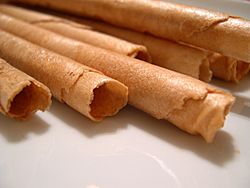Neula facts for kids
 |
|
| Type | Biscuit |
|---|---|
| Place of origin | Spain |
| Region or state | Catalonia |
| Main ingredients | flour, butter, egg whites, sugar, lemon |
Neula (pronounced NEW-lah) is a special type of thin, crispy biscuit from Catalonia, a region in Spain. People traditionally eat neules during Christmas time. They often enjoy them with a bubbly drink called cava (which is like Spanish champagne) and a sweet treat called torró. Many people like to dip their neules into the cava!
Neules are made from a very thin mix of egg whites, butter, sugar, and flour. They are flavored with lemon and then carefully rolled into a tube shape. Today, you can find many fun versions of neules. Some are filled with torró de Xixona, and others are covered in delicious chocolate. Even though they are a Christmas favorite, you can sometimes find neules throughout the year. They are great with desserts like crema catalana or ice cream.
What is a Neula?
The word neula comes from the Latin word nebula, which means fog. This name fits perfectly because neules are so fine and light, just like a misty fog!
Some old papers show that neules were around even before torró. We know torró has been eaten since at least the Middle Ages. For example, it was served at the wedding of the daughter of King Jaume I a very long time ago!
How Neules Are Made
Making neules at home can be a bit tricky. Because they are so light and thin, it takes a lot of skill to get them just right. That's why most people in Catalonia buy their neules from professional bakeries and pastry shops. However, some people still enjoy the challenge of making them at home!
Other Similar Treats
Neules have some relatives around the world!
- In Belgium, there are gaufres (waffles). Even though waffles are much thicker and flat, they actually have a similar origin to neules.
- The Dutch stroopwafels also share a similar history. These are waffles that can be plain or filled.
- In other parts of Spain, you might find rolled biscuits called "barquillos." But "barquillos" are very different from neules. They are much stronger, harder, and thicker. They are also bigger than neules and have a different taste.
See also
 In Spanish: Neula para niños
In Spanish: Neula para niños
 | Delilah Pierce |
 | Gordon Parks |
 | Augusta Savage |
 | Charles Ethan Porter |

